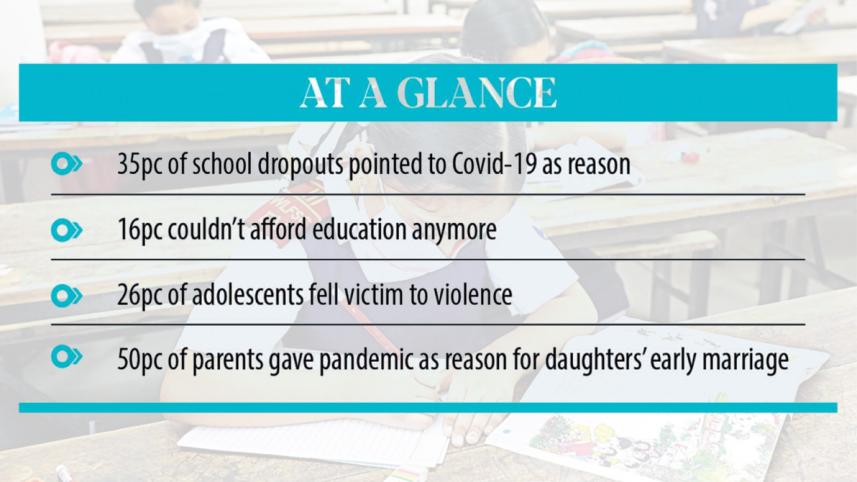Long school closures during pandemic: The kids are not alright

Long-term school closures during the pandemic have badly impacted the lives of adolescents in a multitude of ways, beyond disruption in education, finds a recent study.
The government needs to integrate the issue into its Covid-19 recovery plans to mitigate this impact, said speakers yesterday at the dissemination programme of the study titled "Adolescent Girls' Vulnerabilities and Transitions in the Context of Covid-19", conducted by Brac Institute of Governance and Development (BIGD) and supported by British High Commission and German embassy in Dhaka.
In his opening remarks, Dr Imran Matin, executive director of BIGD, said, "Through our study and discussion, tackling economic distress, ensuring quality education and setting schools as a socialisation platform, emerged strongly as a policy priority."
The study found that adolescents reportedly had to grapple with reduced educational aspirations, poorer psychosocial well-being, increased restrictions and control over social relations, and pressures to start working for a living.
Decisions made by parents and adolescents during the pandemic will influence their future life trajectories by determining their educational achievements, reproductive health and livelihood choices, said the study.
A total of 2,758 households were surveyed, and 3,139 adolescents in 26 upazilas in Gaibandha, Narail, and Cumilla districts were interviewed for the study, conducted from September to November last year.
According to the research, 35 percent of adolescents studied for three to five hours before the pandemic. The percentage went down to 14 percent during the pandemic.
While Covid-19 did not significantly affect drop-out rates, at least 35 percent of the dropouts mentioned that the pandemic led to an unwillingness to study further. Another 16 percent said they could no longer afford education.
Some 26 percent of adolescents fell victims to different types of violence during the pandemic. Boys were more prone to physical violence, while girls were more prone to sexual violence.
Although the study found little variation in the rate of early marriage before and after the pandemic, nearly 50 percent of the parents said that their decision to marry off their daughters was moderately or highly influenced by the pandemic, as they felt they were under social pressure to do so.
Speaking as chief guest, Golam Sarwar, secretary of Law and Justice Division at the Ministry of Law, Justice and Parliamentary Affairs, said, "There is a need to focus on recovery, and support human capability and well-being in a holistic sense, when it comes to policymaking."
The government, development partners and civil society can work together to create a more resilient and inclusive system, he said.
"Bringing both girls and boys back to school is going to be a huge task, with girls' access to education, in particular, becoming even more precarious," said Javed Patel, deputy high commissioner of British High Commission in Dhaka.
"This year completes 50 years of German cooperation in Bangladesh. Studies like these are at the core of development cooperation," said Caren Blume, deputy head of development cooperation at German embassy in Dhaka.
Mentioning that the country's adolescent population is over 32 million, which is 21 percent of the entire population, Dr Angelika Fleddermann, country director of GIZ Bangladesh, said, "Taking timely decisions and making the right choices for girls and boys will determine the future trajectory of their lives and Bangladesh's future."
 For all latest news, follow The Daily Star's Google News channel.
For all latest news, follow The Daily Star's Google News channel.
Comments